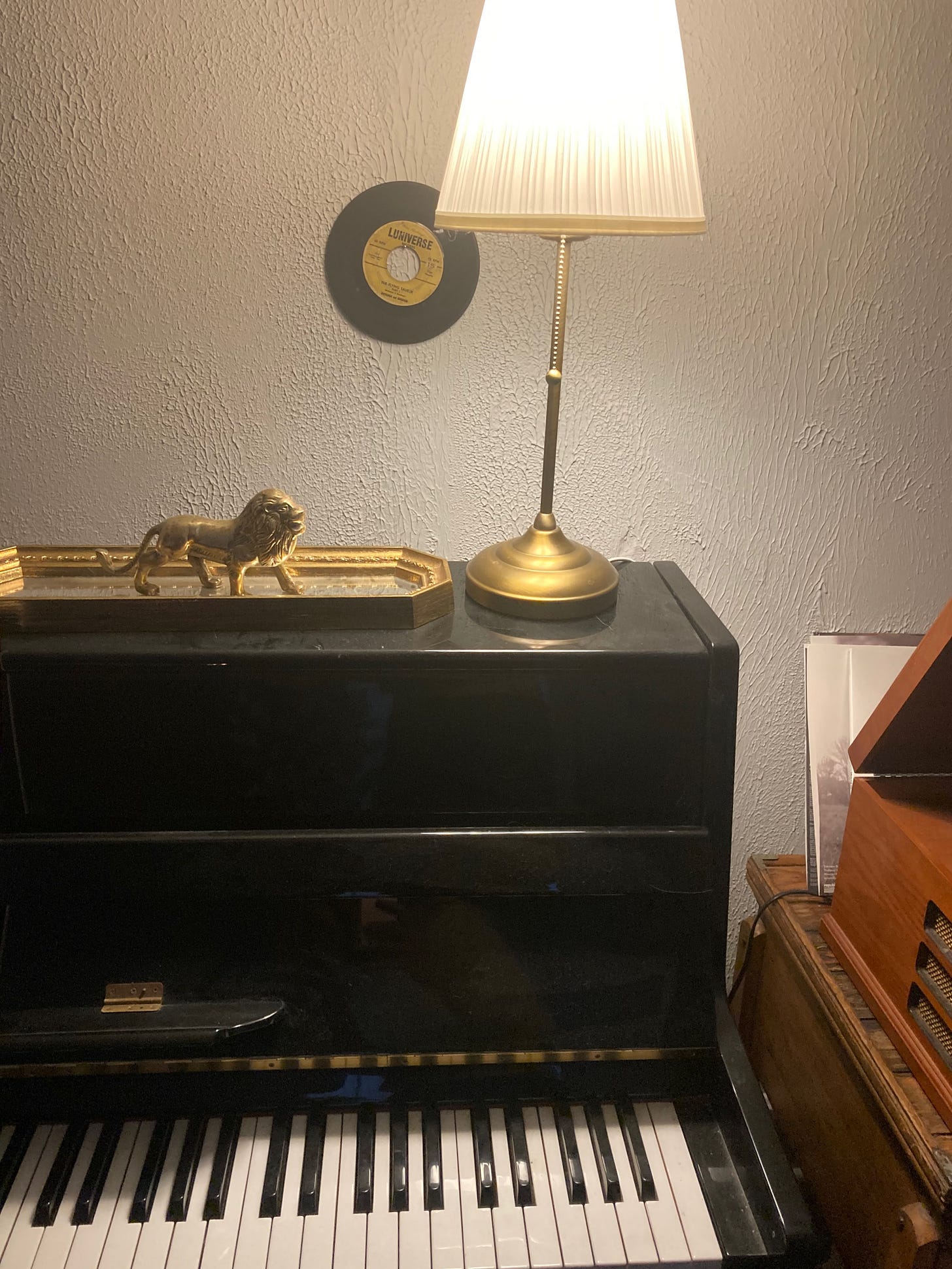MrBeast
is like playing the piano. And an announcement
Dear readers,
This will be my last official Dubious Analogy. In 2022, I wrote an essay called “The Bass Pro Shop is like the music of Enya.” It was a first step for me into so many things—into this vibrant and fascinating platform full of excellent writers, into writing things that I could never pitch an editor, into essays that are a wild thought experiment and a chance to dig out musings from the neglected corners of my brain. Over the next two years I poured out my heart and soul into a corner of the internet that was the first place I could call exclusively my own.
And you joined me along that journey—from the family who bought founding subscriptions to the friends who gave me feedback and encouragement to the (bless you!) subscribers who shock me by not being people that I already know in real life. I’m so thankful that my weird little idea ended up being valuable for you, and am honored that you’ve taken time with my work.
As I’ve reevaluated my professional life going into the new year, a few things have emerged with clarity, one of them that I’m going to pursue a writing career full-time. I will be leaning more into the interests and research that motivated me to get a Ph.D. in theology, the imagination, and the arts in the fall of 2023—writing more from my strengths and my academic background, rather than starting from scratch each week. For me, that means literature, Shakespeare, and cultural commentary. (More about that soon!)
If you’re one of the fantastic, generous people who has a paid subscription to Dubious Analogies, you’ll see your subscription changed to a complimentary Founding Member subscription sometime in the next week. All the archives will remain here, unlocked for you to read at your leisure. I may pop back in occasionally if I come up with an analogy that’s too dubious not to share.
And I’m not leaving Substack! Stay tuned for an email in the next few weeks about what I’m writing next.
with my deepest gratitude,
Emily
Recently, I started playing the piano again. I played in high school, but despite bringing my piano with me almost everywhere I moved like an overly-mobile Sisyphus, I’ve rarely played in the last few years. There were always reasons why not—the piano was out of tune, I might disturb apartment neighbors or roommates, I was out of practice. My skills peaked in high school, plateaued in college, and have gone down since.
It’s been surprising to me in my late twenties to realize how many of the activities I enjoyed in high school were exactly attuned to my specific mental and physical needs. I’ve picked up Irish dancing again, realizing it has benefits for fitness and balance and keeping my wonky ligaments intact; I’m only happy when I am writing as fiendishly as I did in high school; and in high school, when I dove headfirst into Debussy and Beethoven for two hours every day, there was some part of my brain that was quiet, and hasn’t been quiet since.
When you’re practicing the piano, especially when you are trying to learn something fairly serious and challenging, there is no room in your mind for anything else. You’re in another world, a black-and-white world of notes and rests and staves, where the metronome will go on with or without you. You cannot listen to a podcast or an audiobook; you cannot bubble over private resentments and injuries; you cannot worry and you cannot brainstorm. You can only wrestle with the notes until, almost like magic, what you are hearing and what you are seeing and what you are feeling align.
Once you’ve learned something well, though, especially if you have it memorized, your thoughts can come back—but differently. They are tolerated by the music if they will submit to order. You can come to the piano heartbroken and bang out a cathartic part of Chopin’s Raindrop Prelude, or you can sit down to Bach’s inventions with a thorny problem to solve. The order that you have imbibed with the music will pervade your brain, and you leave the heartbreak or the untied knot of your thinking on the keyboard. It’s like putting up bowling bumpers for your mind. You can think, but you can’t veer left or right into an unsolvable morass. Your attention is directed.
I’ve written before about one of my favorite essays of all time, “How Tracy Austin Broke My Heart” by David Foster Wallace. In it, he tries to discover what is going through the mind of a truly great tennis player when they are playing their game—what gives them the ability to “withstand forces of distraction that would break a mind prone to self-conscious fear in two.” He comes to a simple conclusion that has the ring of truth:
The real secret behind top athletes’ genius, then, may be as esoteric and obvious and dull and profound as silence itself. The real, many-veiled answer to the question of just what goes through a great player’s mind as he stands at the center of hostile crowd-noise and lines up the free-throw that will decide the game might well be: nothing at all.
This state of mind has been described throughout the ages in different ways: St. Ignatius of Loyola’s “do what you are doing,” Kirkegaard’s “purity of heart is to will one thing.” I’ll let you fill in the obligatory tangent about smartphones, and kids these days, and everything we lose to being constantly distracted. I’m more interested in the positive side of this: what it really looks like to will one thing, and what can happen when we actually do it.
The one thing that MrBeast wills is YouTube success. I recently listened to his interview with Theo Von and was charmed despite myself: Jimmy Donaldson, better known by his YouTube handle “MrBeast,” is articulate, unassuming, and surprisingly friendly. Donaldson’s content is well-known for being over-the-top and clickbaity (think “Survive 100 Days in a Nuclear Bunker, Win $500,000” and “In 10 Minutes This Room Will Explode!”), but he himself is personable and understated. He runs the most-subscribed channel on YouTube (342M), with a staff of more than 250.
In his interview with Von, Donaldson describes a life dedicated to only one goal. “My whole life I was like, I just want to do YouTube.” He started making YouTube videos when he was eleven: “They were absolute trash. No one watched when I was eleven, no one watched when I was twelve. No one watched when I was thirteen, no one watched when I was fourteen, one watched when I was fifteen.” Nonetheless, Donaldson was so determined to have a YouTube career that, when his mom insisted he go to community college, he drove to campus and worked on videos in his car. He immediately failed out, but by that time he had made $20,000 with the help of a video where he counted to one hundred thousand.
What comes through in Donaldson’s interviews about his work is the monomaniacal obsession that has gotten him to where he is: he sees everything, and seemingly always has seen everything, through the lens of one video platform. Everything in his life aligns with this one goal: he now spends time with his mom by working together. “A lot of our bonding is like doing work stuff and things like that because then it’s something I truly care about,” says Donaldson. “You know, like if we went to a concert, she would see through that facade, she would know I’m not doing that because I care, just doing it to like, check a box. But when we work together it’s genuinely fulfilling.”
This outlook is particularly striking when Donaldson describes a visit to Antarctica. It would make this piece easy to write if I could describe a man totally insensitive to the wonders of the natural world, unable to appreciate Antarctica because of his obsession with YouTube. To the contrary, Donaldson began to wax poetic on what he saw there. “It’s so beautiful. It’s crazy to just see—you’re in the middle of nowhere. It feels like you’re on a different planet.” With anyone else, one would expect a humble (or humblebrag) admission that his career on YouTube makes things like this possible, that he is so thankful to see Antarctica because of his career on YouTube.
But the striking thing about Jimmy Donaldson is that he never makes this category shift. He is not thankful to see Antarctica because of YouTube—he is thankful that Antarctica is so helpful for his YouTube career. At the end of the anecdote, he climbs a mountain there is no record of anyone climbing before. He names it Shopify Mountain, because Shopify sponsored the YouTube video. “I did an ad read—I was like, what’s the most interesting time I can do an ad read… where people wouldn’t click off. I was like, you know, while I’m climbing this mountain, it’ll probably be more interesting.”
There isn’t a shadow of shame in Donaldson’s voice when he describes doing an ad read at the top of an newly-discovered mountain in Antarctica. I don’t think there’s any part of his mind where the phrase “Shopify Mountain” would give rise to a deep and visceral disgust. MrBeast set out to make good YouTube content—good YouTube content gets likes and views—good YouTube content includes Shopify Mountain. Somehow he escapes being grotesque because of his open-eyed innocence about the whole thing. Jimmy Donaldson isn’t duplicitous or malicious; Jimmy Donaldson isn’t lying to himself. Jimmy Donaldson is simply willing one thing, and that thing is YouTube. It is a closed system in which all values are relativized to this singular goal.
I guess when I think about MrBeast I can understand why David Foster Wallace said Tracy Austin broke his heart. Shopify Mountain breaks mine. But here’s the thing—it’s easy to criticize those who have dedicated their life to one thing if we can justify ourselves in believing that that one thing is foolish or problematic or disordered. It’s the case for many of the most successful internet creators: there’s something grotesque and fascinating about someone whose whole life, without exception, seems to be about their dog or their crochet or their houseboat or their water bottle collection or their kids.
But what we miss when we are judging content like that is one fundamental fact: yes, these are disordered focuses, but the mere fact of the focus is exceptional. We might know much better than these content creators do the answer to what the “one thing” we should will is. But many of us, perhaps most of us, fail to dedicate our lives to God or to the love of humanity or to our deepest commitments with the wholeheartedness with which a TikTok creator with 10,000 followers dedicates herself to collecting puzzle erasers. We don’t have the drive to live our lives well that Jimmy Donaldson has for creating loud, expensive YouTube videos. That’s why these internet phenomena are so fascinating—I don’t think we’re only fascinated by them because they are grotesque. We are fascinated by them because they have something we may lack: the order that can direct a life.



